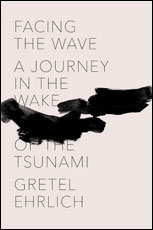Gretel Ehrlich is a lyrical and sensitive writer who has written about nature and her manifold mysteries in The Future of Ice and in Islands, The Universe, Home. She has also probed her own close encounter with death in A Match to the Heart: One Woman's Story of Being Struck by Lightning. In Questions of Heaven, she makes a pilgrimage to China to see what moves her Buddhist heart.
All of these themes form the background for Ehrlich's trip to the northeastern coast of Japan to talk with survivors about the March 2011 earthquake and tsunami. The author describes this destructive and merciless wave as "a mist-spitting, white-crested monster that pulled back fast and drove forward, breaking its own legs, and collapsing onto more than three hundred miles of shore."
Ehrlich is shocked by the devastation of Japan's Tohoku coast and awed by the Shinto prayers being said for the missing and the dead. One person talks about the wandering ghosts in the area while another states, "Everything needs rescuing." Everything except the Fukushima Daiichi nuclear power plant which is being seen as the worst maritime contamination disaster in recorded history.
As Ehrlich listens to the stories of monks, farmers, and fisherman, she sags under the burden of their losses. She quotes Li Kung-Lin who said long ago: "In the sound of heartbreak there is no form or shadow." As we would expect, the author includes a section in the book on the plight of the animals during the tsunami and the large dog rescue operation after it was over.
Throughout Facing the Wave, Ehrlich contemplates impermanence, an essential concept in Buddhism. She writes: "A futureless future looms. The exact way to live with grief and resurrect one's life and livelihood is in no way clear." In a visit with cultural writer Pico Iyer and his wife Hiroko, they talk of the courage and self-discipline of the Japanese people and later Ehrlich shares the cultural phenomenon of Shinto temples being torn down every 20 years and rebuilt exactly as they were. Destruction and renewal are part of the basic rhythms of life and Japanese culture.
A new day is dawning as Facing the Wave ends on a high and holy note of hope.
